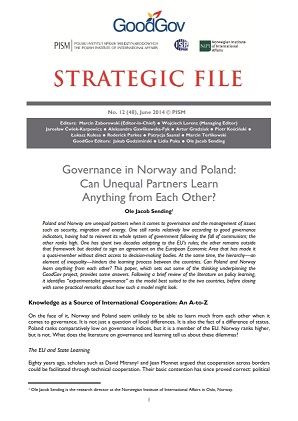№48: Governance in Norway and Poland: Can Unequal Partners Learn Anything from Each Other?
№48: Governance in Norway and Poland: Can Unequal Partners Learn Anything from Each Other?
Author(s): Ole Jacob Sending
Subject(s): Governance, Environmental and Energy policy, Government/Political systems, International relations/trade, Security and defense, Migration Studies
Published by: PISM Polski Instytut Spraw Międzynarodowych
Keywords: Norway; Poland; governance; security; energy; migration; GoodGov Project; experience in governance;
Summary/Abstract: Poland and Norway are unequal partners when it comes to governance and the management of issues such as security, migration and energy. One still ranks relatively low according to good governance indicators, having had to reinvent its whole system of government following the fall of communism; the other ranks high. One has spent two decades adapting to the EU’s rules; the other remains outside that framework but decided to sign an agreement on the European Economic Area that has made it a quasi-member without direct access to decision-making bodies. At the same time, the hierarchy—an element of inequality—hinders the learning process between the countries. Can Poland and Norway learn anything from each other? This paper, which sets out some of the thinking underpinning the GoodGov project, provides some answers. Following a brief review of the literature on policy learning, it identifies “experimentalist governance” as the model best suited to the two countries, before closing with some practical remarks about how such a model might look.
Series: PISM Strategic File
- Page Count: 7
- Publication Year: 2014
- Language: English
- Content File-PDF

